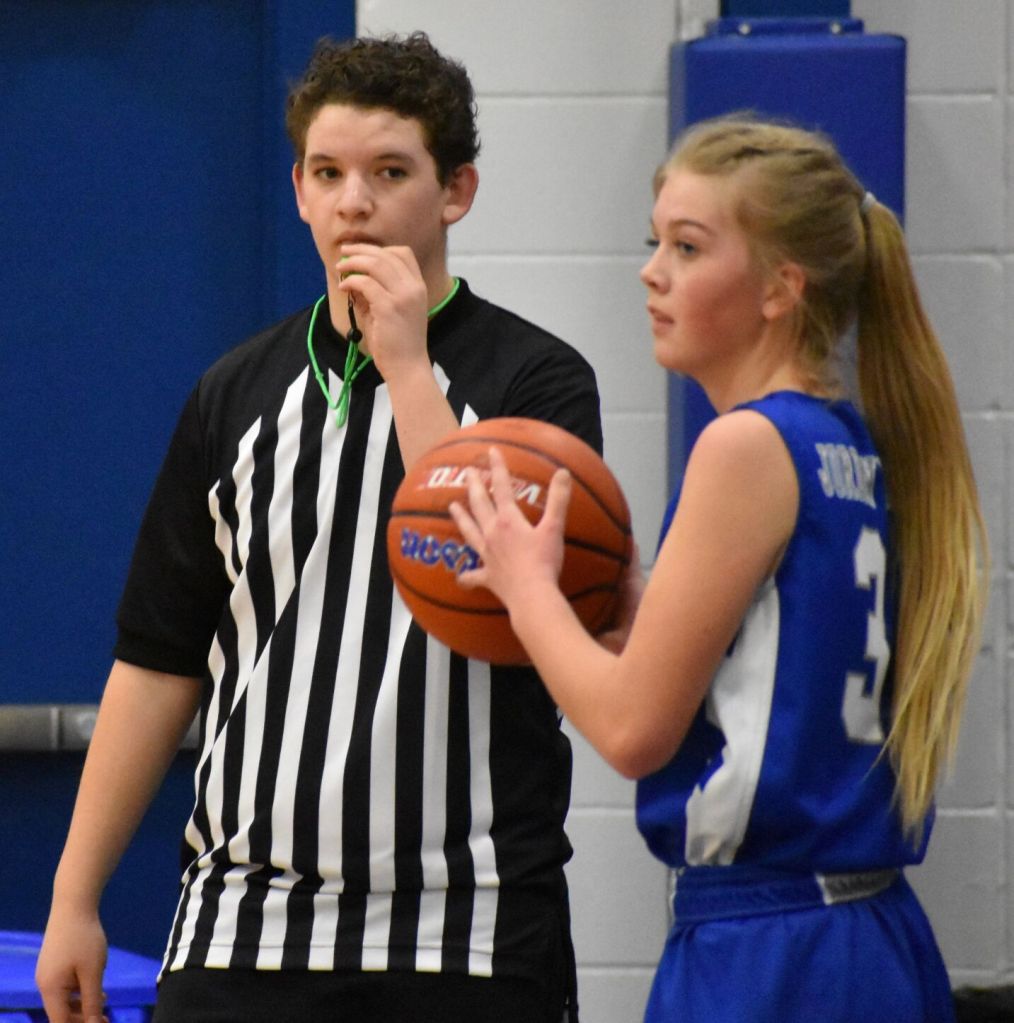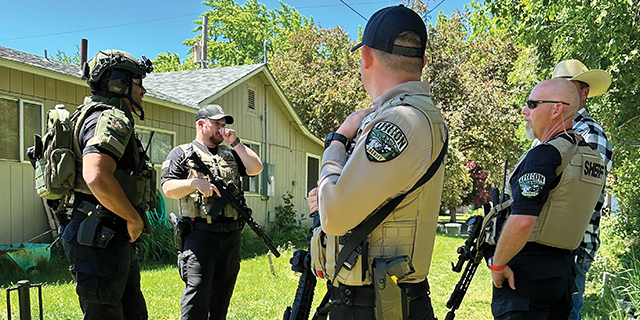Students at Powder Valley are learning to referee basketball games
Published 7:00 pm Thursday, February 22, 2024

- Stran Bingham, a sophomore at Powder Valley High School, officiates a middle school basketball game Feb. 2, 2024, in North Powder.
NORTH POWDER — Sky Nesser isn’t playing basketball this season, but she still is spending a lot of time running up and down the court.
Nesser, a sophomore at Powder Valley, is one of about 10 students who are learning how to referee basketball games.
“It’s really fun, honestly,” she said on Feb. 2, between games of a middle school tournament in North Powder. “It’s a really good experience to be active with basketball and make connections with the kids.”
For this role as an official, the teenagers wear the signature black-and-white-striped tops and use a bright green whistle.
That whistle, said Powder’s athletic director, Brad Dunten, is a signal to the crowd. Before each game he announces “If it’s green, they’re under 18” with the hope that spectators think twice before yelling about a call.
The youth referees have worked games at the elementary and middle school levels, as well as JV2 high school games.
Nesser now knows what it’s like to be on the other side of the whistle.
“I’ve totally changed my outlook on refs,” she said. “It’s hard.”
She said she made a mistake in her first game, and the middle school athletes wouldn’t let her forget it.
“We’re going to make a few here and there. It’s going to happen,” Nesser said.
But she’s going to keep at it.
“I would totally pursue this when I’m older,” she said. “The more I do it, the more I learn.”
Plus, it’s good exercise.
“I’m huffing and puffing,” she said with a laugh.
An official shortage
Training officials from a young age can help with the ongoing shortage of referees for high school contests, Dunten said.
He said there were 80 officials when he started as a ref in 1999. Right now, there are 40 in the Northeast Oregon Basketball Association, which covers 11 schools — and many miles — across Baker, Union and Wallowa counties.
“Any given night we need 15 varsity officials, sometimes 21,” he said. “We have officials now reffing three games (in a night).”
Every junior varsity and varsity basketball game requires three officials.
Of the 40 officials in the local association, 23 are qualified for post-season games.
Another challenge is the Oregon School Activities Association guideline for avoiding a conflict of interest that says an official cannot be assigned to a contest if immediate family members are students or staff at one of the schools — unless both athletic directors agree that it is OK.
For example, Dunten has a brother who coaches at Crane, and another brother who is the athletic director at Cove.
Locally, he said 10 to 15 officials have these conflicts.
Dunten hopes his crew of youth referees will pursue a certification to ref games at higher levels — which would add to the pool of officials.
“I’m hoping they officiate after high school,” he said.
The youth officials are paid $25 per game for middle school, and $60.50 for high school games.
“It’s a good way to make extra money,” Nesser said.
Dunten hopes to offer classes on officiating and coaching — either during the day or after school.
“That’s my goal,” he said.
Youth officials can get certified for varsity contests, but he said that’s tough at Powder where most of the young referees also play on the basketball teams.
But they are still logging experience as an official, which could lead to that higher certification.
“This experience meets the two-year requirement to become a varsity official after graduating high school,” he said.
A new appreciation
Powder Valley seniors Abby Cox and Nevaeh Schuldt officiated several middle school games on Feb. 2 before taking to the court for their own varsity game against Imbler.
Both have played basketball since first grade, but they admitted that officiating gives them an entirely new look at the game.
“Stressful — before the game started I thought ‘do I even know how basketball works?’” Cox said with a laugh.
“You see the foul, then go to the table and forget the number,” Schuldt said.
Neither of the young referees has had much issue with angry fans or players, even though some games have been a bit more stressful.
“It was a super close game and the audience was yelling,” Schuldt said. “I definitely realized how stressful reffing is.”
They’ve had positive feedback, too.
“When the coaches say you’re doing good, that makes you feel better,” Schuldt said.
Sophomore Kellee Dixon said the quick reactions required as an official can be a challenge.
“The hardest thing is to see it and immediately blow the whistle,” she said.
Sophomore Stran Bingham officiated three middle school games, half of a JV2 girls game and then played in the boys varsity contest against Imbler on Feb. 2.
He’s not new to basketball — he started playing in first grade — but said he now understands how officials can sometimes miss calls during a hectic game.
Also, he said some calls are easier than others.
“The hardest foul to call is a charge,” he said.
The National Federation of State High School Associations launched a “Bench Bad Behavior” campaign in 2022 to address unsportsmanlike behavior at sporting events across the nation.
The idea came from the first NFHS Officiating Consortium in April 2022, said Dana Marie Pappas, director of officiating services for NFHS.
“There was so much discussion at this consortium about the ill effects of adult behavior (mostly spectators) on the kids’ games that the NFHS pledged to address it on a broad scale,” she said.
The campaign started in September 2022 and was the topic at a second officiating consortium in January 2023.
“These consortiums hosted individuals from all sports and all levels from across the country, where the common themes were the officials’ shortage and the behavioral crisis plaguing high school and youth sports,” she said.
Dr. Karissa Niehoff, CEO of NFHS, covered the topic of unsportsmanlike conduct in a 2022 column of “The NFHS Voice.” She shared several examples of fan behavior, including physical assaults against referees.
“High schools must establish a culture that values the worth of every single person — both players on the school’s team and players on the opposing team,” she wrote in the column. “There must be a no-tolerance policy regarding behavior that shows disrespect for another individual.”
Schools can share the “Bench Bad Behavior” campaign with a toolkit, designed by NFHS, that includes letters, signs and social media messages.
The social media posts include wording such as: “Fans: No one is perfect. Including You”; “Don’t be THAT fan” and “Parents: You’re embarrassing your student!”
Find these resources at benchbadbehavior.com/toolkit.
Pappas said a 2023 survey of 36,000 officials conducted by the National Association of Sports Officials found that 68% said sportsmanship is getting worse, with the poorest behavior in competitive youth contests and high school. The survey also found that parents (39.8%) and coaches (26.6%) were creating the most problems.
Pappas said the survey revealed that 51% of those who responded “felt unsafe or feared for their safety because of an administrator, coach, player or spectator” and that nearly 12% had been physically assaulted.
“All of this data definitely affects not only the pool of current officials, but also has an impact on our ability to recruit new ones into the avocation,” Pappas said.
She pointed out that officials are essential to sports.
“We need to keep in mind that without officials, kids lose out on the opportunity to participate,” she said. “In many cases, at the youth and high school levels, the officials are still learning too, just like the kids. Officials will make mistakes — so will players and coaches, so we have to temper our behavior and realize that interscholastic sports in particular are an extension of the classroom.”
Behavior, she said, is something that everyone can control. As a comparison, she pointed to the COVID pandemic shutdowns, which caused the cancellation of sporting contests.
“All parents and fans wanted was for their kids to play sports. None of us had any control over the shutdowns,” she said.
Now, the shortage of officials can cause games to be canceled or rescheduled — what she calls the “new pandemic of the poor fan behavior.”
“Sportsmanship is worsening and the impact of that on the pool of officials is something that each of us can harness because we all control what comes out of our mouths, how we act and react while sitting in the stands, and how we behave at contests,” she said. “The result of no officials because of behavior is the same result as the pandemic — kids not participating in the games they love.”
To learn more about becoming an official in Oregon, visit www.osaa.org/officials or newofficials.org.
— Lisa Britton





